Tuesday, January 22, 2019
As 2018 drew to a close, BPN reached out to state propane executives to discuss their plans for 2019. While addressing lost revenue and Volkswagen Settlement opportunities were high on many 2018 priority lists, growing gallons and workforce development were two of the highest priorities in many states for 2019. Among the common themes reported by state executives were the following: a colder winter was helpful to the industry after two previous warm winters and the polar vortex that resulted in huge supply shortages in early 2014; state associations made necessary adjustments in 2018 budgets caused by the loss of dues' revenue; and gaining results from the Volkswagen Settlement has been a slow process. 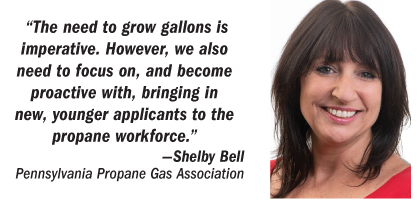
Growing Gallons
Pennsylvania is typical of many states in planning to utilize a digital marketing campaign to promote propane use. Like many state Propane Education & Research Councils (PERCs), Pennsylvania partners with others to promote propane including the Pennsylvania Plumbing-Heating-Cooling Contractors Association, PennAg Industries Association, and Pennsylvania Manufactured Housing Association. “We will have a 33-week digital campaign that runs May to December,” said Shelby Bell, executive director of the Pennsylvania Propane Gas Association. “We also have the entitlement to 70 ‘Post Game Shows’ for Penn State Football. For Men’s and Women’s Basketball, heard on the Penn State Sports Network’s 50-plus stations, propane will be featured in opening and closing billboards and taglines going to and coming from commercial breaks during the games.” Bell notes that they also participate in Celebrate Agriculture Day, which includes a scholarship donation to the Penn State College of Agricultural Sciences.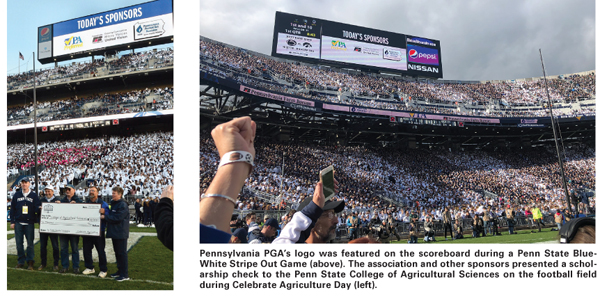
In Louisiana, participation in home builder and government trade shows are two major ways propane is promoted. “We are also reviewing our past promotion during broadcasts of the New Orleans Saints, LSU, and Louisiana Tech football games, as well as broadcasts of high school athletics,” said Louisiana association executive director Randy Hayden. “Some of those promotions may be pared back, but I am confident we will be sponsoring the Miss Louisiana Pageant as well as the Zurich Open, which is the only PGA event in Louisiana and also the only pairs tournament in the tour. These events provide great exposure to our ‘Fuel for the Future’ campaign.”
North Carolina continues to be very successful adding propane water heaters with the incentive of a $150 rebate. “We used to offer more, but the demand has been so strong we cut the rebate to accommodate all applicants,” said North Carolina Propane Gas Association president/CEO John Jessup. “Continued contact to provide incentives to HVAC and plumbing professionals is key to adding propane load in rural homes throughout North Carolina.” Dale Calhoun, executive vice-president of the Florida Propane Gas Association, said a strong relationship with the head of the Florida Home Builders Association has helped propane companies in the state to add propane load to Florida homes. “We always seek a direct relationship with home builders to get our message about the benefits of propane to them,” Calhoun said. “In addition to personal relationships, we use digital marketing with emails, pop-ups, and banner ads to keep in front of home builders and HVAC and plumbing professionals. We use our national PERC funds to provide appliance rebates in our effort to get at least two to four more appliances into each home that already uses propane.”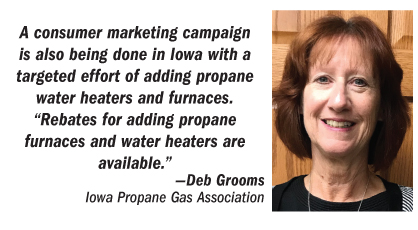
A consumer marketing campaign is also being done in Iowa with a targeted effort of adding propane water heaters and furnaces. “We are getting the message out cost-effectively with the help of Warm Thoughts Communications,” Iowa Propane Gas Association CEO Deb Grooms said. “Rebates for adding propane furnaces and water heaters are available.” She also noted that for the first time Iowa propane marketers would be participating in the Iowa Power Farming Show in January in Des Moines. “This is organized by the Iowa-Nebraska Farm Equipment Dealers Association for farmers,” Grooms said. In Arkansas, executive director Sherman Murray said Arkansas money from PERC is being used to fund a water heater rebate for the first time this year. “The rebates are typically $200 for adding a water heater, but an additional $100 is also available to offset costs if new gas lines must be run,” Murray explained. “Rising electricity costs are making propane look more favorable,” said Roger Leider, executive director of the Minnesota Propane Association. “Our appliance rebate program allows marketers with local plumbing and heating dealers to install more propane products.”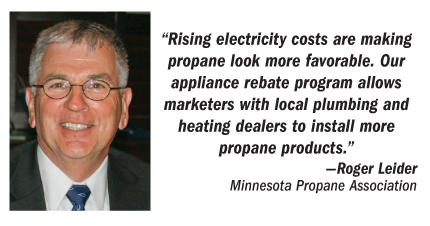
Volkswagen Settlement Opportunities
Several state association leaders were aware that Louisiana was the first known state to be awarded Volkswagen Settlement dollars. “We don’t yet know the details, but I was told that some Louisiana school systems were receiving Volkswagen Settlement dollars to fund propane school buses,” said Hayden of Louisiana. “We’ve had a good relationship with school boards and school bus people. I felt there were some progressive areas of the state that had a good shot at receiving VW settlement dollars to add propane school buses.” Just to the north, Murray of Arkansas is not optimistic about receiving any VW settlement dollars. “I understand the choice was made to go 100% with rewarding natural gas and electric,” Murray said. “We feel that propane was given a back seat on this.” With no settlement dollars awarded yet, Missouri Propane Gas Association president/CEO Steve Ahrens said the Missouri PERC will continue to educate stakeholders on the opportunities for propane buses through the state’s VW funding program.
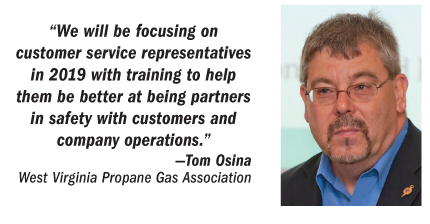
West Virginia is one of a few states that have not even held any public hearings regarding possible uses of its share of the VW Environmental Mitigation funds. “We have provided initial comments recommending the use of propane-powered vehicles for schools and municipal fleet vehicles,” said WVPGA executive director Tom Osina. “WVPGA continues to partner with the VW Clean States program on this and related issues.” Meanwhile, in Illinois, executive director Aaron DeWeese said they are in the second round of fighting for VW Settlement funds. “We’d like to see funds carved out for school buses and fleet vehicles for all parts of the state, not just Chicago and East St. Louis. The rural areas have been left in the cold,” he said. “NOx emissions from diesel engines are particularly bad for young students. Propane can give us the most bang for our buck while reducing emissions.”
Workforce Development
Many observers are very convinced that workforce development goes hand-in-hand with workforce training and that many prospective employees judge their potential success in a new industry by the training that will be available to them. “The need to grow gallons is imperative,” said Bell of Pennsylvania. “However, we also need to focus on, and become proactive with, bringing in new, younger applicants to the propane workforce. Pennsylvania is eager to partner with NPGA and PERC on workforce development in 2019.”
With eight military bases in North Carolina, Jessup said the state is continuing to move toward creating a school for technicians with a focus on people coming out of the military. “With an aging workforce, we’re just seeing more and more companies recruiting employees from each other and these employees are getting closer and closer to retirement.” In early November, North Carolina received funding totaling $250,000 from the national PERC to launch the school as a pilot program. “A lot of wheels are now in motion with the PERC funding,” Jessup said. “We are moving the ball down the road.”
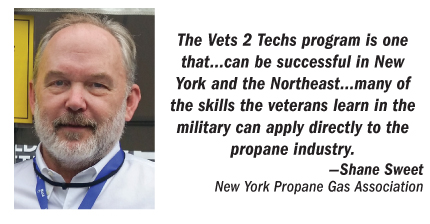 For Shane Sweet, executive and technical director of the New York Propane Gas Association, the Vets 2 Techs program is one that he feels can be successful in New York and the Northeast. The Vets 2 Techs program states that the oil and propane industries are largely made up of family-owned businesses and it believes these close-knit families appreciate the loyalty, hard work, and dedication it takes to serve in the military, the same attributes that these businesses look for in employees. They also believe that many of the skills the veterans learn in the military can apply directly to the propane industry. Sweet and Leslie Anderson, president and CEO of the Propane Gas Association of New England (PGANE), are drafting a PERC funding request for implementing a Vets 2 Techs program in New York and the New England region. “We are not asking for funds for infrastructure,” Sweet said. “We are hot to get this off the ground.”
For Shane Sweet, executive and technical director of the New York Propane Gas Association, the Vets 2 Techs program is one that he feels can be successful in New York and the Northeast. The Vets 2 Techs program states that the oil and propane industries are largely made up of family-owned businesses and it believes these close-knit families appreciate the loyalty, hard work, and dedication it takes to serve in the military, the same attributes that these businesses look for in employees. They also believe that many of the skills the veterans learn in the military can apply directly to the propane industry. Sweet and Leslie Anderson, president and CEO of the Propane Gas Association of New England (PGANE), are drafting a PERC funding request for implementing a Vets 2 Techs program in New York and the New England region. “We are not asking for funds for infrastructure,” Sweet said. “We are hot to get this off the ground.” 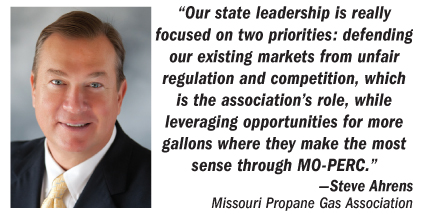
In Missouri, Ahrens said that a full 64% of marketers in the state reported the need for more bobtail drivers. “There are opportunities to build partnerships with technical schools and transportation providers. But we want to evaluate the potential for gain. This would be an easy area to spend money and see no real result, so we are moving deliberately at this point.” Missouri has already enjoyed success with an HVAC and plumber training program. “This ensures the installers in Missouri are properly trained, it makes them more likely to install propane water heaters and furnaces, and the program creates another source of additional revenue for the Missouri Propane Gas Association,” Ahrens added.
Alabama’s executive director Lisa Hill said that her association is beginning to work with state community colleges, trade schools, and high school technical centers to implement the inclusion of PERC’s Overview of Propane Distribution Systems into HVAC and plumbing programs through the state. “Mark Denton of Blossman Gas and I recently met with Lawson State Community College in Bessemer to introduce the program to them. We were encouraged by the dialog at the meeting and believe they could potentially be a good partner for us,” said Hill. “In late October, we had a PERC Southeast Regional meeting that included both SE state leaders and PERC leaders. Workforce development was a hot topic at this meeting.”
Many Options for Workforce Training
“Last year we focused on driver safety and improvement with our biannual Bobtail Truck Rodeo,” West Virginia’s Osina said. “We will be focusing on customer service representatives in 2019 with training to help them be better at being partners in safety with customers and company operations.” In Florida, a new online continuing education program has been created and is expected to be approved and available by the beginning of 2019. “We have a state bureau that must approve all propane or hazmat courses to be taught in Florida,” Calhoun said. Iowa is implementing a safety meeting for propane company owners to guarantee they are in compliance with all rules of DOT, OSHA, and others. “We felt it was [imperative] to take this important course directly to the owner,” Grooms said. “Safety is top priority and training is a critical step in that process,” said Pennsylvania’s Bell. “We will hold training classes from May until September. In 2018, we hosted 14 different classes and trained over 200 industry personnel and look to do the same in 2019.”
Subsidized Utility Expansion and Legislative Concerns 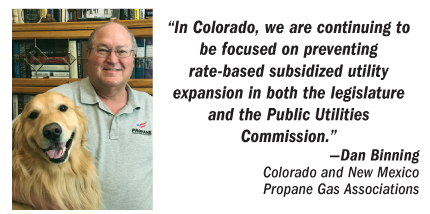 “In Colorado, we are continuing to be focused on preventing rate-based subsidized utility expansion in both the legislature and the Public Utilities Commission,” said Dan Binning, executive director for both the Colorado and New Mexico Propane Gas Associations. “This is probably going to be more difficult as both houses of the legislature and the governor’s office have swung significantly to the left. In New Mexico, we are actively working on getting limited liability legislation passed. We are working with NPGA and our lobbyist in this effort. Also, as in Colorado, we are keeping an eye on the legislature and Public Utilities Commission to make sure that energy choice is left to competition and not made by government fiat.”
“In Colorado, we are continuing to be focused on preventing rate-based subsidized utility expansion in both the legislature and the Public Utilities Commission,” said Dan Binning, executive director for both the Colorado and New Mexico Propane Gas Associations. “This is probably going to be more difficult as both houses of the legislature and the governor’s office have swung significantly to the left. In New Mexico, we are actively working on getting limited liability legislation passed. We are working with NPGA and our lobbyist in this effort. Also, as in Colorado, we are keeping an eye on the legislature and Public Utilities Commission to make sure that energy choice is left to competition and not made by government fiat.”
DeWeese in Illinois is also concerned about the continued battle with subsidized natural gas expansion while PGANE’s Anderson has worries about electricity. “We are very concerned about the ‘Electrify Everything’ movement,” she said. “We are putting together legislative outreach materials regarding our concerns.”
Association Adjustments 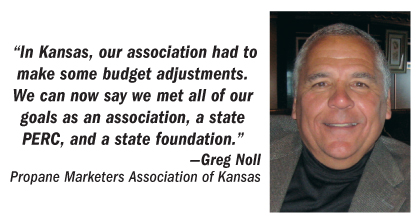 Most state leaders felt adjustments to the reduction in dues income were made fairly quickly. “In Kansas, our association had to make some budget adjustments. We can now say we met all of our goals as an association, a state PERC, and a state foundation,” said Greg Noll, executive director of the Propane Marketers Association of Kansas. “Our training season went well and our marketers are looking forward to getting out there for another productive winter.”
Most state leaders felt adjustments to the reduction in dues income were made fairly quickly. “In Kansas, our association had to make some budget adjustments. We can now say we met all of our goals as an association, a state PERC, and a state foundation,” said Greg Noll, executive director of the Propane Marketers Association of Kansas. “Our training season went well and our marketers are looking forward to getting out there for another productive winter.”
Ahrens of Missouri said potential shortfalls for 2018 didn’t materialize thanks to adjustments made early on. “Ensuring that we have the financial stability to serve our members is paramount. While our dues income was lower than 2017, which we anticipated, our training income was higher thanks to a consistent outreach to HVAC and installer personnel. On the expense side, our costs were about $25,000 less than the previous year due to some strategic trimming and, frankly, good luck.” Despite losing the dues income of one large member and the erosion of independents who sold to larger companies, Ahrens said the association ended in positive territory for FY2018.
While the trend of lower dues income persists, Ahrens said that his approach for 2019 isn’t to worry about defections, but to aggressively provide value to industry partners to earn their support. “Our state leadership is really focused on two priorities: defending our existing markets from unfair regulation and competition, which is the association’s role, while leveraging opportunities for more gallons where they make the most sense through MO-PERC. Our marketers understand that it takes two healthy organizations to do this and they have shown tremendous support.”
Ahrens said that the recent rightsizing of the MPGA board, coupled with expanded access to committee service on MO-PERC, has allowed both industry organizations to be more nimble and more targeted. “For many years, MPGA had a rather large board which tried to do it all while MO-PERC served in the background,” Ahrens explained. “We reduced the size of the association board to address the momentum-robbing ‘no report’ reality of the previous meetings. Now, MPGA focuses on building a competitive business environment through governmental affairs, regulatory oversight, and education. We believe building a better business environment is critical to our mission, and that will be our focus throughout 2019.”
On the MO-PERC side, Ahrens points to the Council’s leadership which has been key in encouraging more marketer input. “We invite non-Council marketers to participate on specific committees where they have an interest. We do more of the work with calls rather than in-person meetings,” he said. “We know that a volunteer may have valuable experience to contribute but isn’t interested in devoting 40 hours each year serving on a board. Through the committees, we can encourage and accommodate those who can give us six to eight hours each year, and we have a better product at the end of the day.”
Planning for Mother Nature’s Wrath 2018-2019
The Florida Propane Gas Association has had to respond to back-to-back hurricanes with Hurricanes Irma in 2017 and Michael in 2018. “Preparedness for emergencies like this always has to be part of ongoing planning in a state like Florida,” Calhoun pointed out. “Hurricane Michael was an absolutely devastating storm and it will be five to six years before the hardest-hit areas return to any kind of normal. While this had a big impact on the marketers, most of those affected were multi-state marketers who could bring in resources from outside the impacted area.”
While Florida has its hurricanes, the Northeast has its polar vortexes and bomb cyclones. “We are now doing webinars several times a year with meteorologist John Bagioni to help our members understand what Mother Nature may hold in store for us,” said PGANE’s Anderson. “We are currently recommending hedging for a colder-than-normal winter. With experience from 2013-14 and again in 2017-18, we are seeing marketers investing more and more to be truly prepared. Upgrading the size of storage, expanding bulk plants, and adding storage are all key activities that are helping to alleviate supply concerns.” —Pat Thornton

Growing Gallons
Pennsylvania is typical of many states in planning to utilize a digital marketing campaign to promote propane use. Like many state Propane Education & Research Councils (PERCs), Pennsylvania partners with others to promote propane including the Pennsylvania Plumbing-Heating-Cooling Contractors Association, PennAg Industries Association, and Pennsylvania Manufactured Housing Association. “We will have a 33-week digital campaign that runs May to December,” said Shelby Bell, executive director of the Pennsylvania Propane Gas Association. “We also have the entitlement to 70 ‘Post Game Shows’ for Penn State Football. For Men’s and Women’s Basketball, heard on the Penn State Sports Network’s 50-plus stations, propane will be featured in opening and closing billboards and taglines going to and coming from commercial breaks during the games.” Bell notes that they also participate in Celebrate Agriculture Day, which includes a scholarship donation to the Penn State College of Agricultural Sciences.

In Louisiana, participation in home builder and government trade shows are two major ways propane is promoted. “We are also reviewing our past promotion during broadcasts of the New Orleans Saints, LSU, and Louisiana Tech football games, as well as broadcasts of high school athletics,” said Louisiana association executive director Randy Hayden. “Some of those promotions may be pared back, but I am confident we will be sponsoring the Miss Louisiana Pageant as well as the Zurich Open, which is the only PGA event in Louisiana and also the only pairs tournament in the tour. These events provide great exposure to our ‘Fuel for the Future’ campaign.”
North Carolina continues to be very successful adding propane water heaters with the incentive of a $150 rebate. “We used to offer more, but the demand has been so strong we cut the rebate to accommodate all applicants,” said North Carolina Propane Gas Association president/CEO John Jessup. “Continued contact to provide incentives to HVAC and plumbing professionals is key to adding propane load in rural homes throughout North Carolina.” Dale Calhoun, executive vice-president of the Florida Propane Gas Association, said a strong relationship with the head of the Florida Home Builders Association has helped propane companies in the state to add propane load to Florida homes. “We always seek a direct relationship with home builders to get our message about the benefits of propane to them,” Calhoun said. “In addition to personal relationships, we use digital marketing with emails, pop-ups, and banner ads to keep in front of home builders and HVAC and plumbing professionals. We use our national PERC funds to provide appliance rebates in our effort to get at least two to four more appliances into each home that already uses propane.”

A consumer marketing campaign is also being done in Iowa with a targeted effort of adding propane water heaters and furnaces. “We are getting the message out cost-effectively with the help of Warm Thoughts Communications,” Iowa Propane Gas Association CEO Deb Grooms said. “Rebates for adding propane furnaces and water heaters are available.” She also noted that for the first time Iowa propane marketers would be participating in the Iowa Power Farming Show in January in Des Moines. “This is organized by the Iowa-Nebraska Farm Equipment Dealers Association for farmers,” Grooms said. In Arkansas, executive director Sherman Murray said Arkansas money from PERC is being used to fund a water heater rebate for the first time this year. “The rebates are typically $200 for adding a water heater, but an additional $100 is also available to offset costs if new gas lines must be run,” Murray explained. “Rising electricity costs are making propane look more favorable,” said Roger Leider, executive director of the Minnesota Propane Association. “Our appliance rebate program allows marketers with local plumbing and heating dealers to install more propane products.”

Volkswagen Settlement Opportunities
Several state association leaders were aware that Louisiana was the first known state to be awarded Volkswagen Settlement dollars. “We don’t yet know the details, but I was told that some Louisiana school systems were receiving Volkswagen Settlement dollars to fund propane school buses,” said Hayden of Louisiana. “We’ve had a good relationship with school boards and school bus people. I felt there were some progressive areas of the state that had a good shot at receiving VW settlement dollars to add propane school buses.” Just to the north, Murray of Arkansas is not optimistic about receiving any VW settlement dollars. “I understand the choice was made to go 100% with rewarding natural gas and electric,” Murray said. “We feel that propane was given a back seat on this.” With no settlement dollars awarded yet, Missouri Propane Gas Association president/CEO Steve Ahrens said the Missouri PERC will continue to educate stakeholders on the opportunities for propane buses through the state’s VW funding program.

West Virginia is one of a few states that have not even held any public hearings regarding possible uses of its share of the VW Environmental Mitigation funds. “We have provided initial comments recommending the use of propane-powered vehicles for schools and municipal fleet vehicles,” said WVPGA executive director Tom Osina. “WVPGA continues to partner with the VW Clean States program on this and related issues.” Meanwhile, in Illinois, executive director Aaron DeWeese said they are in the second round of fighting for VW Settlement funds. “We’d like to see funds carved out for school buses and fleet vehicles for all parts of the state, not just Chicago and East St. Louis. The rural areas have been left in the cold,” he said. “NOx emissions from diesel engines are particularly bad for young students. Propane can give us the most bang for our buck while reducing emissions.”
Workforce Development
Many observers are very convinced that workforce development goes hand-in-hand with workforce training and that many prospective employees judge their potential success in a new industry by the training that will be available to them. “The need to grow gallons is imperative,” said Bell of Pennsylvania. “However, we also need to focus on, and become proactive with, bringing in new, younger applicants to the propane workforce. Pennsylvania is eager to partner with NPGA and PERC on workforce development in 2019.”
With eight military bases in North Carolina, Jessup said the state is continuing to move toward creating a school for technicians with a focus on people coming out of the military. “With an aging workforce, we’re just seeing more and more companies recruiting employees from each other and these employees are getting closer and closer to retirement.” In early November, North Carolina received funding totaling $250,000 from the national PERC to launch the school as a pilot program. “A lot of wheels are now in motion with the PERC funding,” Jessup said. “We are moving the ball down the road.”
 For Shane Sweet, executive and technical director of the New York Propane Gas Association, the Vets 2 Techs program is one that he feels can be successful in New York and the Northeast. The Vets 2 Techs program states that the oil and propane industries are largely made up of family-owned businesses and it believes these close-knit families appreciate the loyalty, hard work, and dedication it takes to serve in the military, the same attributes that these businesses look for in employees. They also believe that many of the skills the veterans learn in the military can apply directly to the propane industry. Sweet and Leslie Anderson, president and CEO of the Propane Gas Association of New England (PGANE), are drafting a PERC funding request for implementing a Vets 2 Techs program in New York and the New England region. “We are not asking for funds for infrastructure,” Sweet said. “We are hot to get this off the ground.”
For Shane Sweet, executive and technical director of the New York Propane Gas Association, the Vets 2 Techs program is one that he feels can be successful in New York and the Northeast. The Vets 2 Techs program states that the oil and propane industries are largely made up of family-owned businesses and it believes these close-knit families appreciate the loyalty, hard work, and dedication it takes to serve in the military, the same attributes that these businesses look for in employees. They also believe that many of the skills the veterans learn in the military can apply directly to the propane industry. Sweet and Leslie Anderson, president and CEO of the Propane Gas Association of New England (PGANE), are drafting a PERC funding request for implementing a Vets 2 Techs program in New York and the New England region. “We are not asking for funds for infrastructure,” Sweet said. “We are hot to get this off the ground.”
In Missouri, Ahrens said that a full 64% of marketers in the state reported the need for more bobtail drivers. “There are opportunities to build partnerships with technical schools and transportation providers. But we want to evaluate the potential for gain. This would be an easy area to spend money and see no real result, so we are moving deliberately at this point.” Missouri has already enjoyed success with an HVAC and plumber training program. “This ensures the installers in Missouri are properly trained, it makes them more likely to install propane water heaters and furnaces, and the program creates another source of additional revenue for the Missouri Propane Gas Association,” Ahrens added.
Alabama’s executive director Lisa Hill said that her association is beginning to work with state community colleges, trade schools, and high school technical centers to implement the inclusion of PERC’s Overview of Propane Distribution Systems into HVAC and plumbing programs through the state. “Mark Denton of Blossman Gas and I recently met with Lawson State Community College in Bessemer to introduce the program to them. We were encouraged by the dialog at the meeting and believe they could potentially be a good partner for us,” said Hill. “In late October, we had a PERC Southeast Regional meeting that included both SE state leaders and PERC leaders. Workforce development was a hot topic at this meeting.”
Many Options for Workforce Training
“Last year we focused on driver safety and improvement with our biannual Bobtail Truck Rodeo,” West Virginia’s Osina said. “We will be focusing on customer service representatives in 2019 with training to help them be better at being partners in safety with customers and company operations.” In Florida, a new online continuing education program has been created and is expected to be approved and available by the beginning of 2019. “We have a state bureau that must approve all propane or hazmat courses to be taught in Florida,” Calhoun said. Iowa is implementing a safety meeting for propane company owners to guarantee they are in compliance with all rules of DOT, OSHA, and others. “We felt it was [imperative] to take this important course directly to the owner,” Grooms said. “Safety is top priority and training is a critical step in that process,” said Pennsylvania’s Bell. “We will hold training classes from May until September. In 2018, we hosted 14 different classes and trained over 200 industry personnel and look to do the same in 2019.”
Subsidized Utility Expansion and Legislative Concerns
 “In Colorado, we are continuing to be focused on preventing rate-based subsidized utility expansion in both the legislature and the Public Utilities Commission,” said Dan Binning, executive director for both the Colorado and New Mexico Propane Gas Associations. “This is probably going to be more difficult as both houses of the legislature and the governor’s office have swung significantly to the left. In New Mexico, we are actively working on getting limited liability legislation passed. We are working with NPGA and our lobbyist in this effort. Also, as in Colorado, we are keeping an eye on the legislature and Public Utilities Commission to make sure that energy choice is left to competition and not made by government fiat.”
“In Colorado, we are continuing to be focused on preventing rate-based subsidized utility expansion in both the legislature and the Public Utilities Commission,” said Dan Binning, executive director for both the Colorado and New Mexico Propane Gas Associations. “This is probably going to be more difficult as both houses of the legislature and the governor’s office have swung significantly to the left. In New Mexico, we are actively working on getting limited liability legislation passed. We are working with NPGA and our lobbyist in this effort. Also, as in Colorado, we are keeping an eye on the legislature and Public Utilities Commission to make sure that energy choice is left to competition and not made by government fiat.”DeWeese in Illinois is also concerned about the continued battle with subsidized natural gas expansion while PGANE’s Anderson has worries about electricity. “We are very concerned about the ‘Electrify Everything’ movement,” she said. “We are putting together legislative outreach materials regarding our concerns.”
Association Adjustments
 Most state leaders felt adjustments to the reduction in dues income were made fairly quickly. “In Kansas, our association had to make some budget adjustments. We can now say we met all of our goals as an association, a state PERC, and a state foundation,” said Greg Noll, executive director of the Propane Marketers Association of Kansas. “Our training season went well and our marketers are looking forward to getting out there for another productive winter.”
Most state leaders felt adjustments to the reduction in dues income were made fairly quickly. “In Kansas, our association had to make some budget adjustments. We can now say we met all of our goals as an association, a state PERC, and a state foundation,” said Greg Noll, executive director of the Propane Marketers Association of Kansas. “Our training season went well and our marketers are looking forward to getting out there for another productive winter.”Ahrens of Missouri said potential shortfalls for 2018 didn’t materialize thanks to adjustments made early on. “Ensuring that we have the financial stability to serve our members is paramount. While our dues income was lower than 2017, which we anticipated, our training income was higher thanks to a consistent outreach to HVAC and installer personnel. On the expense side, our costs were about $25,000 less than the previous year due to some strategic trimming and, frankly, good luck.” Despite losing the dues income of one large member and the erosion of independents who sold to larger companies, Ahrens said the association ended in positive territory for FY2018.
While the trend of lower dues income persists, Ahrens said that his approach for 2019 isn’t to worry about defections, but to aggressively provide value to industry partners to earn their support. “Our state leadership is really focused on two priorities: defending our existing markets from unfair regulation and competition, which is the association’s role, while leveraging opportunities for more gallons where they make the most sense through MO-PERC. Our marketers understand that it takes two healthy organizations to do this and they have shown tremendous support.”
Ahrens said that the recent rightsizing of the MPGA board, coupled with expanded access to committee service on MO-PERC, has allowed both industry organizations to be more nimble and more targeted. “For many years, MPGA had a rather large board which tried to do it all while MO-PERC served in the background,” Ahrens explained. “We reduced the size of the association board to address the momentum-robbing ‘no report’ reality of the previous meetings. Now, MPGA focuses on building a competitive business environment through governmental affairs, regulatory oversight, and education. We believe building a better business environment is critical to our mission, and that will be our focus throughout 2019.”
On the MO-PERC side, Ahrens points to the Council’s leadership which has been key in encouraging more marketer input. “We invite non-Council marketers to participate on specific committees where they have an interest. We do more of the work with calls rather than in-person meetings,” he said. “We know that a volunteer may have valuable experience to contribute but isn’t interested in devoting 40 hours each year serving on a board. Through the committees, we can encourage and accommodate those who can give us six to eight hours each year, and we have a better product at the end of the day.”
Planning for Mother Nature’s Wrath 2018-2019
The Florida Propane Gas Association has had to respond to back-to-back hurricanes with Hurricanes Irma in 2017 and Michael in 2018. “Preparedness for emergencies like this always has to be part of ongoing planning in a state like Florida,” Calhoun pointed out. “Hurricane Michael was an absolutely devastating storm and it will be five to six years before the hardest-hit areas return to any kind of normal. While this had a big impact on the marketers, most of those affected were multi-state marketers who could bring in resources from outside the impacted area.”
While Florida has its hurricanes, the Northeast has its polar vortexes and bomb cyclones. “We are now doing webinars several times a year with meteorologist John Bagioni to help our members understand what Mother Nature may hold in store for us,” said PGANE’s Anderson. “We are currently recommending hedging for a colder-than-normal winter. With experience from 2013-14 and again in 2017-18, we are seeing marketers investing more and more to be truly prepared. Upgrading the size of storage, expanding bulk plants, and adding storage are all key activities that are helping to alleviate supply concerns.” —Pat Thornton

